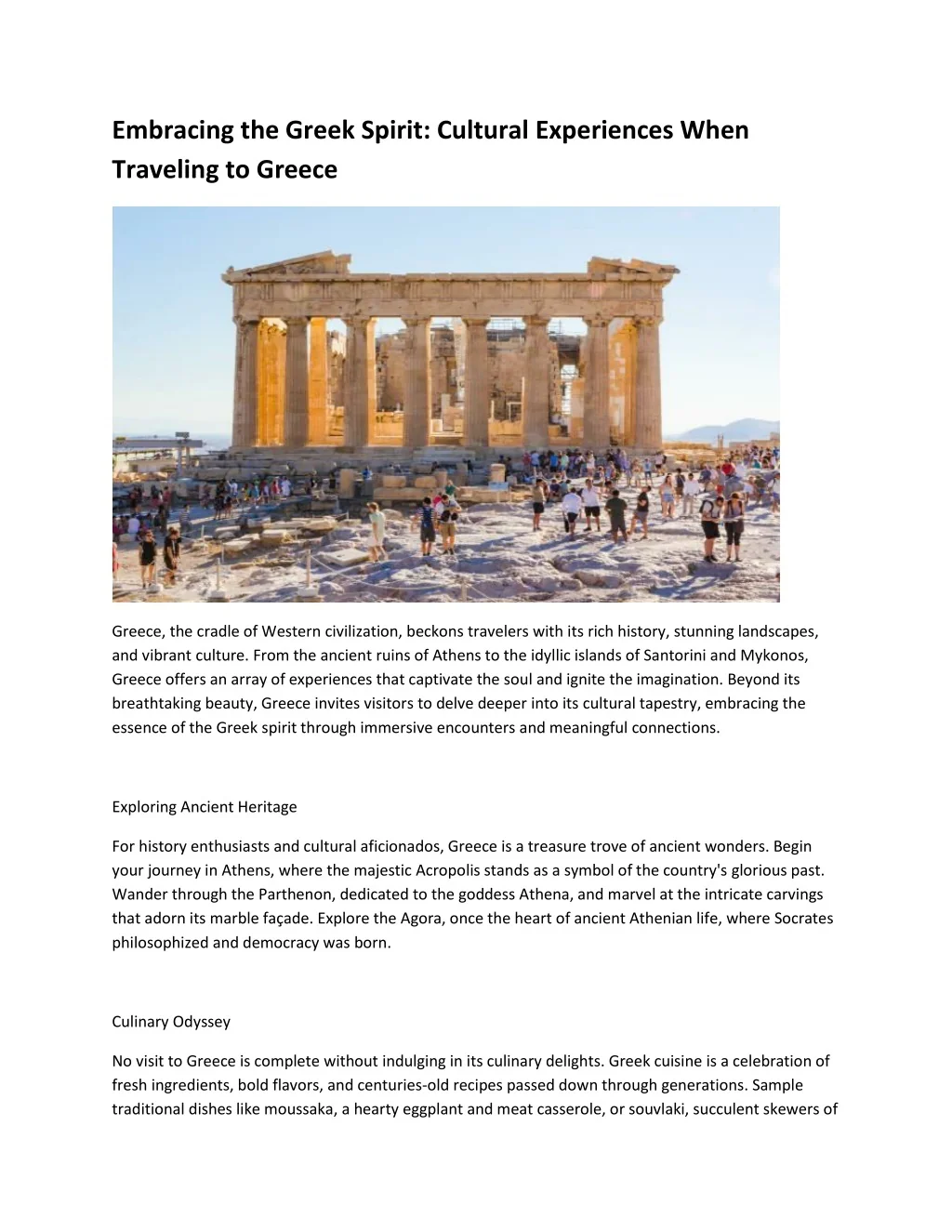
Embarking on a journey to Greece is more than just seeing ancient ruins and beautiful beaches; it’s an invitation to delve into a vibrant, ancient culture. To truly enrich your travel, understanding the culture of Greece for a memorable experience is paramount. From its deeply rooted hospitality to its strong family values and timeless traditions, Greek culture offers a tapestry of warmth, history, and profound human connection that transforms a simple trip into an unforgettable adventure. This comprehensive guide will illuminate the nuances of Greek life, providing insights and practical advice to help you connect deeply with the heart and soul of this remarkable nation.
The Heart of Greece: Core Cultural Values and Beliefs
Greek culture is built upon foundations that have stood the test of millennia, shaping a society rich in tradition and personal connection. These core values permeate every aspect of daily life, offering visitors a unique window into the Greek spirit. Delving into these beliefs is key to truly appreciating your time in the country.
Philoxenia: The Art of Greek Hospitality
One of the most defining characteristics of Greek culture is philoxenia, meaning "love of strangers" or hospitality. This isn’t merely politeness; it’s a deep-seated tradition of welcoming guests with open arms, often extending to sharing food, drink, and personal stories. Greeks genuinely enjoy hosting and will often go out of their way to ensure a visitor feels comfortable and cared for.
Practical Tip: Embrace offers of coffee or a small treat, even if you’re not hungry. A polite refusal might be misunderstood, whereas accepting shows appreciation for their generosity. A simple "Efharisto" (thank you) goes a long way.
Family First: The Pillars of Greek Society
The family unit is the absolute cornerstone of Greek society, far more so than in many Western cultures. Extended families often live in close proximity, and intergenerational bonds are incredibly strong. Respect for elders, support for younger generations, and communal decision-making are deeply ingrained. Family gatherings are frequent, loud, and joyous affairs, often revolving around food.
Embracing Filotimo: Honor and Respect in Greek Culture
Filotimo is a complex concept with no direct English translation, often described as a sense of honor, dignity, self-respect, and moral obligation. It encompasses pride in oneself, one’s family, and one’s community, coupled with a deep sense of social responsibility. Acting with filotimo means doing the right thing, often going above and beyond expectations for others, without seeking personal gain. It’s about maintaining face and earning respect.
The Enduring Spirit of Greek Orthodox Faith
Religion plays a significant role in Greek life, with the vast majority of Greeks adhering to the Greek Orthodox Church. This faith deeply influences traditions, holidays, and daily rituals. Churches are prevalent in every town and village, serving as spiritual and community hubs. Religious festivals are important social events, and iconography is a ubiquitous art form. While not overtly religious, understanding its foundational influence helps grasp many Greek customs.
Navigating Social Etiquette in Greece: Tips for Travelers
Understanding and respecting local customs can significantly enhance your interactions and ensure a smoother, more enjoyable travel experience. Greek social etiquette, while generally relaxed, has nuances worth knowing.
Greetings and Gestures: Communicating with Greeks
Greeks are warm and expressive. A firm handshake is common upon meeting, and close friends or family often greet with a hug and a kiss on each cheek. Direct eye contact is generally seen as a sign of honesty and confidence. Be mindful of hand gestures; for example, an open palm with fingers spread (the moutza) is highly offensive. Thumbs up is generally positive, but be cautious with ambiguous gestures.
Key Insight: Learn a few basic Greek phrases. Even a simple "Kalimera" (good morning), "Kalispera" (good evening), and "Efharisto" (thank you) will be met with appreciation and warmth.
Dining Etiquette: Sharing a Greek Meal
Meals in Greece are often long, social affairs meant to be savored. Dinner typically starts late, often after 9 PM. Food is frequently served family-style, with dishes placed in the center for everyone to share. It’s considered rude to refuse food, though taking a small portion is acceptable. Don’t be surprised if your host encourages you to eat more; it’s a sign of their philoxenia.
- Pacing: Don’t rush your meal. Enjoy the conversation and the company.
- Toasting: When raising a glass, say "Yamas!" (to our health!).
- Tipping: Tipping is customary in restaurants, usually 10-15% for good service.
Public Behavior: What to Do and What to Avoid
Greeks are generally laid-back, but certain public behaviors are frowned upon. Excessive public displays of affection might be seen as inappropriate outside of very touristy areas. While casual dress is fine for most sightseeing, when visiting churches or monasteries, dress modestly: shoulders and knees should be covered. Many religious sites will offer wraps or skirts if you forget. Loud arguments or disrespectful behavior are generally met with disapproval.
A Taste of Greece: Culinary Culture and Traditions
Greek cuisine is a cornerstone of its culture, reflecting history, geography, and a deep appreciation for fresh, local ingredients. Eating is a communal experience, a celebration of life, family, and friendship. Truly understanding Greek culture through its food is an immersive journey in itself.
The Mediterranean Diet: More Than Just Food
The Greek diet is famously healthy, centered around fresh vegetables, fruits, legumes, whole grains, olive oil, and fish, with moderate amounts of dairy and meat. It’s not just about what’s eaten, but how it’s prepared and shared. Meals are often cooked from scratch, using seasonal produce, and enjoyed slowly in good company. This approach to food embodies a holistic view of well-being.
Must-Try Dishes:
- Moussaka: Layered eggplant, minced meat, and béchamel sauce.
- Souvlaki: Grilled skewers of meat, often pork or chicken.
- Greek Salad (Horiatiki): Fresh tomatoes, cucumbers, onions, olives, feta, and olive oil.
- Tzatziki: Yogurt dip with cucumber, garlic, and dill.
- Spanakopita: Spinach and feta cheese pie.
Coffee Culture: The Heartbeat of Greek Social Life
Coffee isn’t just a beverage in Greece; it’s a social ritual. From morning to late evening, Greeks gather in kafeneia (traditional coffee houses) and modern cafes to socialize, discuss politics, and simply watch the world go by. The most popular drink is frappé, an iced instant coffee, though traditional Greek coffee (a strong, unfiltered brew) and modern espresso drinks are also widely consumed.
Experience It: Spend an hour at a local kafeneio. Order a coffee, relax, and observe the lively interactions around you. It’s a fantastic way to soak in the local atmosphere.
Local Markets and Tavernas: Experiencing Authentic Greek Flavors
To truly immerse yourself in Greek culinary culture, visit local food markets (laiki agora). Here, you’ll find an abundance of fresh, seasonal produce, local cheeses, olives, and regional specialties. Dining at a traditional taverna or estiatorio (restaurant) is also essential. Look for places popular with locals, often indicated by bustling tables and simple decor, for the most authentic experience. Don’t hesitate to ask for recommendations or see what’s fresh that day.
Celebrating Greece: Festivals, Music, and Art
Greek culture is vibrantly expressed through its numerous festivals, ancient musical traditions, and a rich artistic heritage that spans millennia. Participating in or observing these cultural expressions can provide deep insights into the Greek soul.
Religious Festivals: Celebrating Greek Orthodox Traditions
Religious holidays are deeply significant in Greece, marked by elaborate church services, processions, and family gatherings. Easter (Páscha) is the most important, celebrated with immense fervor, traditional foods like magiritsa soup, and midnight fireworks. Other significant celebrations include the Assumption of Mary (August 15th) and various saints’ days, often celebrated with local panigýria (festivals) featuring food, music, and dance.
Insight: If you’re traveling during a major religious festival, research local customs and be respectful of any closures or altered schedules. These times offer a unique glimpse into the spiritual life of Greece.
Traditional Music and Dance: The Soul of Greek Festivities
Greek music and dance are an integral part of celebrations, from weddings to village festivals. Instruments like the bouzouki, lyra, and clarinet create distinctive sounds. Traditional dances, such as the sirtaki (made famous by "Zorba the Greek") and hasapiko, are performed with infectious energy and precision. These dances often tell stories or reflect historical events, uniting participants in communal joy.
Experience It: Seek out a local panigýri if possible. Join in the dancing, or simply enjoy the lively atmosphere and the sense of community. Many tourist areas also offer Greek dance nights.
The Legacy of Greek Art and Architecture
Greece’s contribution to art and architecture is unparalleled, from the monumental temples of the Acropolis to the intricate mosaics of Byzantine churches. Even today, art remains a vital part of Greek identity, expressed through contemporary painting, sculpture, and craftsmanship. Exploring museums and ancient sites is crucial for understanding the historical depth of Greek creativity.
Practical Tips for Immersive Travel in Greece
Beyond understanding the cultural values, some practical considerations will help you engage respectfully and fully with your Greek experience. These tips are designed to foster genuine connection and deeper appreciation.
Learning Basic Greek Phrases: A Key to Connection
As mentioned, even a few words of Greek can open doors. Locals appreciate the effort, and it can lead to warmer interactions and even better service.
Essential Phrases:
- Hello/Goodbye (formal): Yassas
- Hello/Goodbye (informal): Yassou
- Please: Parakalo
- Yes: Nai
- No: Ohi
- Excuse me/Sorry: Signomi
- How are you?: Ti kanis?
Dressing Respectfully: Especially in Sacred Sites
While Greece is a modern European country, modesty is still valued, particularly in religious settings. When visiting churches, monasteries, or even some smaller, traditional villages, it’s advisable to dress conservatively. This means covering shoulders and knees. Women may be expected to wear skirts or dresses rather than trousers in some very traditional monasteries. Keep a light scarf or wrap handy for spontaneous visits.
Supporting Local Businesses: Contributing to Greek Culture
One of the best ways to immerse yourself in and contribute to Greek culture is by supporting local businesses. Choose family-run tavernas over international chains, buy souvenirs from local artisans, and use local guides. This not only puts money directly into the local economy but also provides a more authentic experience, allowing you to interact with the people who truly embody Greek traditions and craftsmanship.
Consider this: When buying produce, opt for small, independent greengrocers or the local market. The freshness and personal service are often superior.
Conclusion: Embracing the Greek Way for a Truly Memorable Experience
Understanding the culture of Greece for a memorable experience is not just about ticking off sights; it’s about opening yourself to a different way of life, a rich history, and the profound warmth of its people. By embracing philoxenia, respecting family values, and engaging with the vibrant culinary, artistic, and religious traditions, you transform your journey from a mere vacation into a truly immersive adventure. From the bustling kafeneia to the quiet reverence of an ancient monastery, every interaction offers a chance to connect with the authentic spirit of Greece. So, pack your bags, prepare your heart, and allow the timeless charm of Greek culture to leave an indelible mark on your soul.










